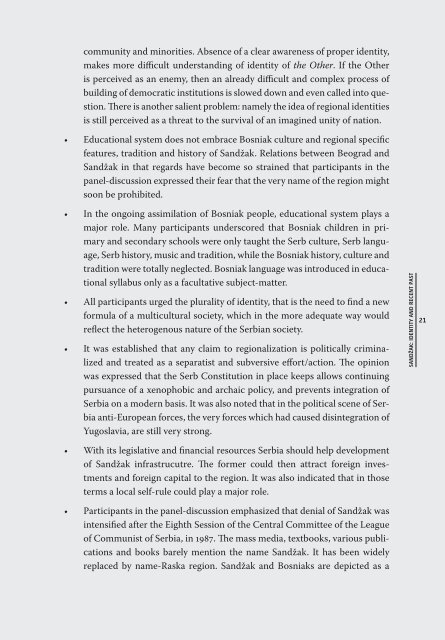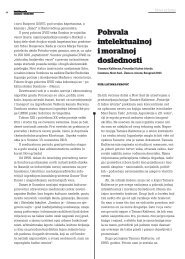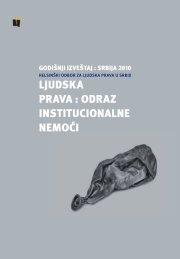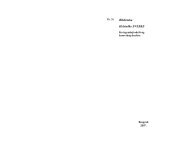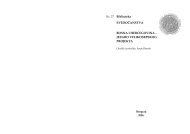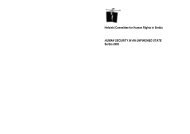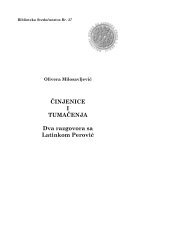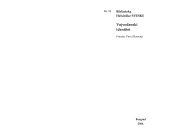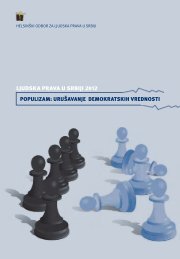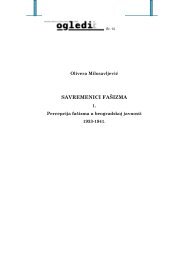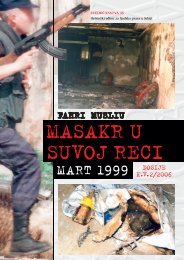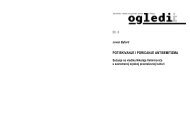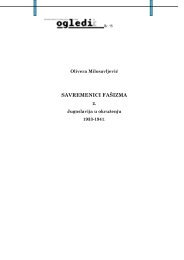- Page 1: SANDŽAK IDENTITET U PROCEPU STAROG
- Page 4 and 5: iblioteka Helsinške sveske knjiga
- Page 7 and 8: SANDŽAK - IDENTITET U PROCEPU STAR
- Page 9 and 10: Sandžak: identity and recent past
- Page 11 and 12: Sandžak: identity and recent past
- Page 13 and 14: Sandžak: identity and recent past
- Page 15 and 16: Sandžak: identity and recent past
- Page 17 and 18: Sandžak: identity and recent past
- Page 19: Sandžak: identity and recent past
- Page 23: Sandžak: identity and recent past
- Page 26 and 27: Novi koncept identiteta 26 NOVI KON
- Page 28 and 29: 28 NOVI KONCEPT IDENTITETA i simbol
- Page 30 and 31: I Panel: Identitet na Balkanu 30 NO
- Page 32 and 33: 32 NOVI KONCEPT IDENTITETA uniji, s
- Page 34 and 35: 34 NOVI KONCEPT IDENTITETA Velika z
- Page 36 and 37: 36 NOVI KONCEPT IDENTITETA Musliman
- Page 38 and 39: SONJA BISERKO Ja bih samo dodala da
- Page 40 and 41: desilo na prostorima Balkana. Ja sa
- Page 42 and 43: 42 NOVI KONCEPT IDENTITETA je laž,
- Page 44 and 45: MEHMED SLEZOVIĆ Budući da je rasp
- Page 46 and 47: 46 NOVI KONCEPT IDENTITETA DŽEMAIL
- Page 48 and 49: Prijepolju, uvijek si manjina, ako
- Page 50 and 51: 50 NOVI KONCEPT IDENTITETA dalje i
- Page 52 and 53: 52 NOVI KONCEPT IDENTITETA Do najte
- Page 54 and 55: 54 NOVI KONCEPT IDENTITETA strašno
- Page 56 and 57: 56 NOVI KONCEPT IDENTITETA treba da
- Page 58 and 59: strani kapital da u njega ulaže. U
- Page 60 and 61: 60 NOVI KONCEPT IDENTITETA UČESNIK
- Page 62 and 63: progres i vrlo protivrečan, on ima
- Page 64 and 65: ono u šta ne verujemo i moram da k
- Page 66 and 67: zakonom, sa savetom, sa uvođenjem
- Page 68 and 69: 68 NOVI KONCEPT IDENTITETA Đinđi
- Page 70 and 71:
vas sada ne bi bilo.“ I pokojni M
- Page 72 and 73:
72 NOVI KONCEPT IDENTITETA Ako je o
- Page 74 and 75:
74 NOVI KONCEPT IDENTITETA pisao od
- Page 76 and 77:
76 NOVI KONCEPT IDENTITETA određen
- Page 78 and 79:
78 NOVI KONCEPT IDENTITETA ovde kod
- Page 80 and 81:
80 NOVI KONCEPT IDENTITETA suprotno
- Page 82 and 83:
82 NOVI KONCEPT IDENTITETA računar
- Page 84 and 85:
mene je nepoznanica. I, pre nego š
- Page 86 and 87:
86 NOVI KONCEPT IDENTITETA - riječ
- Page 88 and 89:
88 NOVI KONCEPT IDENTITETA htijenju
- Page 90 and 91:
90 NOVI KONCEPT IDENTITETA kaže: -
- Page 92 and 93:
92 NOVI KONCEPT IDENTITETA odnosno
- Page 94 and 95:
94 NOVI KONCEPT IDENTITETA naši o
- Page 96 and 97:
iko to može da poveruje. Postoji d
- Page 98 and 99:
partnera, jer, ako ga ne prepoznaje
- Page 100 and 101:
- upoznaću vas sa sledećim: rahme
- Page 102 and 103:
102 NOVI KONCEPT IDENTITETA ZIBIJA
- Page 104 and 105:
104 NOVI KONCEPT IDENTITETA izbora,
- Page 106 and 107:
106 NOVI KONCEPT IDENTITETA Recimo,
- Page 108 and 109:
108 NOVI KONCEPT IDENTITETA dakle,
- Page 110 and 111:
110 NOVI KONCEPT IDENTITETA Srbiju
- Page 112 and 113:
112 NOVI KONCEPT IDENTITETA Danas b
- Page 114 and 115:
114 NOVI KONCEPT IDENTITETA o svako
- Page 116 and 117:
sebi priušti osnovni lek, a mi ovd
- Page 118 and 119:
V Panel: Represija kao činilac ide
- Page 120 and 121:
120 NOVI KONCEPT IDENTITETA Cane Ja
- Page 122 and 123:
koja se, pak, mora bazirati na raci
- Page 124 and 125:
124 NOVI KONCEPT IDENTITETA Novog P
- Page 126 and 127:
potpunog mijenjanja tog, odbacivanj
- Page 128 and 129:
LATINKA PEROVIĆ Identitet nije sta
- Page 130 and 131:
VI Panel: Kultura u oblikovanju reg
- Page 132 and 133:
132 NOVI KONCEPT IDENTITETA funkcij
- Page 134 and 135:
134 NOVI KONCEPT IDENTITETA Vi ste
- Page 136 and 137:
136 NOVI KONCEPT IDENTITETA možda
- Page 138 and 139:
138 NOVI KONCEPT IDENTITETA jedno p
- Page 140 and 141:
140 NOVI KONCEPT IDENTITETA da kaž
- Page 142 and 143:
142 NOVI KONCEPT IDENTITETA jal i e
- Page 144 and 145:
144 NOVI KONCEPT IDENTITETA kulturi
- Page 146 and 147:
146 NOVI KONCEPT IDENTITETA jedinst
- Page 148 and 149:
148 NOVI KONCEPT IDENTITETA određe
- Page 150 and 151:
150 NOVI KONCEPT IDENTITETA Dobrice
- Page 152 and 153:
152
- Page 154 and 155:
Državna politika i Sandžak 154 DR
- Page 156 and 157:
156 DRŽAVNA POLITIKA I SANDŽAK Ne
- Page 158 and 159:
158 DRŽAVNA POLITIKA I SANDŽAK je
- Page 160 and 161:
160 DRŽAVNA POLITIKA I SANDŽAK se
- Page 162 and 163:
162 DRŽAVNA POLITIKA I SANDŽAK nj
- Page 164 and 165:
164 DRŽAVNA POLITIKA I SANDŽAK nj
- Page 166 and 167:
166 DRŽAVNA POLITIKA I SANDŽAK ko
- Page 168 and 169:
ŽAN-ARNO DEREN Nova socijalna tež
- Page 170 and 171:
170
- Page 172 and 173:
posledice represivne politike drža
- Page 174 and 175:
174 POSLEDICE REPRESIVNE POLITIKE D
- Page 176 and 177:
176 POSLEDICE REPRESIVNE POLITIKE D
- Page 178 and 179:
178 POSLEDICE REPRESIVNE POLITIKE D
- Page 180 and 181:
180 POSLEDICE REPRESIVNE POLITIKE D
- Page 182 and 183:
182 POSLEDICE REPRESIVNE POLITIKE D
- Page 184 and 185:
184 POSLEDICE REPRESIVNE POLITIKE D
- Page 186 and 187:
186 POSLEDICE REPRESIVNE POLITIKE D
- Page 188 and 189:
188 POSLEDICE REPRESIVNE POLITIKE D
- Page 190 and 191:
190 POSLEDICE REPRESIVNE POLITIKE D
- Page 192 and 193:
192 POSLEDICE REPRESIVNE POLITIKE D
- Page 194 and 195:
194 POSLEDICE REPRESIVNE POLITIKE D
- Page 196 and 197:
196 POSLEDICE REPRESIVNE POLITIKE D
- Page 198 and 199:
u procesu današnjeg, iliti savreme
- Page 200 and 201:
200 POSLEDICE REPRESIVNE POLITIKE D
- Page 202 and 203:
202 POSLEDICE REPRESIVNE POLITIKE D
- Page 204 and 205:
204
- Page 206 and 207:
206 POSLEDICE REPRESIVNE POLITIKE D
- Page 208 and 209:
208 SRPSKI SANDŽAK I DALJE ZABORAV
- Page 210 and 211:
Uvod 210 SRPSKI SANDŽAK I DALJE ZA
- Page 212 and 213:
Dva lica Sandžaka: Pazar i Raška
- Page 214 and 215:
214 SRPSKI SANDŽAK I DALJE ZABORAV
- Page 216 and 217:
(1560.) i Altun-Alem (iz xvi veka),
- Page 218 and 219:
218 SRPSKI SANDŽAK I DALJE ZABORAV
- Page 220 and 221:
220 SRPSKI SANDŽAK I DALJE ZABORAV
- Page 222 and 223:
222 SRPSKI SANDŽAK I DALJE ZABORAV
- Page 224 and 225:
224 SRPSKI SANDŽAK I DALJE ZABORAV
- Page 226 and 227:
226 SRPSKI SANDŽAK I DALJE ZABORAV
- Page 228 and 229:
i demokratije kao delotvornu retori
- Page 230 and 231:
230 SRPSKI SANDŽAK I DALJE ZABORAV
- Page 232 and 233:
232 SRPSKI SANDŽAK I DALJE ZABORAV
- Page 234 and 235:
234 SRPSKI SANDŽAK I DALJE ZABORAV
- Page 236 and 237:
236 SRPSKI SANDŽAK I DALJE ZABORAV
- Page 238 and 239:
238 SRPSKI SANDŽAK I DALJE ZABORAV
- Page 240 and 241:
od srpskih sagovornika čula da se
- Page 242 and 243:
242 SRPSKI SANDŽAK I DALJE ZABORAV
- Page 244 and 245:
244 SRPSKI SANDŽAK I DALJE ZABORAV
- Page 246 and 247:
U svojim retkim pojavljivanjima u j
- Page 248 and 249:
248 SRPSKI SANDŽAK I DALJE ZABORAV
- Page 250 and 251:
250 SRPSKI SANDŽAK I DALJE ZABORAV
- Page 252 and 253:
252 SRPSKI SANDŽAK I DALJE ZABORAV
- Page 254 and 255:
FAKTOR VERE 254 SRPSKI SANDŽAK I D
- Page 256 and 257:
256 SRPSKI SANDŽAK I DALJE ZABORAV
- Page 258 and 259:
258 SRPSKI SANDŽAK I DALJE ZABORAV
- Page 260 and 261:
260 SRPSKI SANDŽAK I DALJE ZABORAV
- Page 262 and 263:
262 SRPSKI SANDŽAK I DALJE ZABORAV
- Page 264 and 265:
Daleko od toga da Crkva u Sandžaku
- Page 266 and 267:
266 SRPSKI SANDŽAK I DALJE ZABORAV
- Page 268 and 269:
zitet, već skup isturenih nastavni
- Page 270 and 271:
270 SRPSKI SANDŽAK I DALJE ZABORAV
- Page 272 and 273:
272 SRPSKI SANDŽAK I DALJE ZABORAV
- Page 274 and 275:
uobičajena je praksa da se pre pov
- Page 276 and 277:
Izgleda da policija često nije spo
- Page 278 and 279:
278 SRPSKI SANDŽAK I DALJE ZABORAV
- Page 280 and 281:
280 SRPSKI SANDŽAK I DALJE ZABORAV
- Page 282 and 283:
282 SRPSKI SANDŽAK I DALJE ZABORAV
- Page 284 and 285:
284 SRPSKI SANDŽAK I DALJE ZABORAV
- Page 286 and 287:
286 SRPSKI SANDŽAK I DALJE ZABORAV
- Page 288 and 289:
288 SRPSKI SANDŽAK I DALJE ZABORAV
- Page 290 and 291:
290 SRPSKI SANDŽAK I DALJE ZABORAV
- Page 292 and 293:
292 SRPSKI SANDŽAK I DALJE ZABORAV
- Page 294 and 295:
294 SRPSKI SANDŽAK I DALJE ZABORAV
- Page 296 and 297:
296 SRPSKI SANDŽAK I DALJE ZABORAV
- Page 299:
HELSINŠKI ODBOR ZA LJUDSKA PRAVA U


